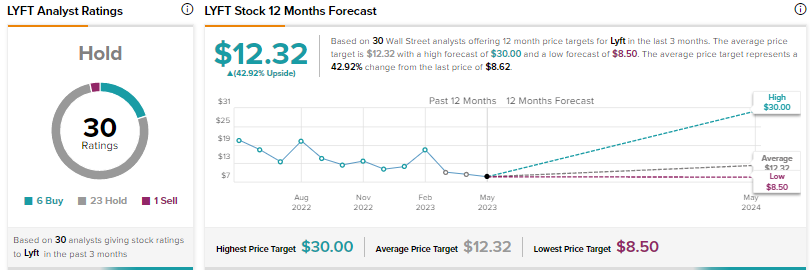Lyft (NASDAQ:LYFT) shares have been declining since the ride-sharing company issued a weak guidance for the second quarter, overshadowing better-than-expected Q1 results. The stock has fallen nearly 19% over the past five days and is down 22% year-to-date in contrast to the 54% rally in Uber (NYSE:UBER) stock. Given the poor Q2 guidance, investors continue to be concerned about the company losing ground to larger rival Uber.
Meet Your ETF AI Analyst
- Discover how TipRanks' ETF AI Analyst can help you make smarter investment decisions
- Explore ETFs TipRanks' users love and see what insights the ETF AI Analyst reveals about the ones you follow.
Lyft is Still Struggling
Lyft’s revenue grew 14% to $1 billion in Q1 2023 and exceeded expectations. However, the company’s 1% to 3% year-over-year revenue growth Q2 guidance disappointed investors, who were expecting more from the company after a leadership change.
David Risher, a former Amazon (AMZN) executive, assumed the role of Lyft’s CEO last month, as co-founders Logan Green (former CEO) and John Zimmer decided to step back from their management roles.
Moreover, comparisons with larger and diversified rival Uber also raised concerns. Uber’s revenue grew 29% to $8.8 billion, thanks to a 72% jump in its ride-hailing or mobility segment and a 23% rise in the food delivery unit.
Uber’s dominant position in key markets is driving a strong rebound following a pandemic-induced slump. Uber has an extensive global presence, while Lyft runs its ride-sharing business in North America. Citing YipitData, the Wall Street Journal highlighted that Uber still commands a 70% share of the U.S. ride-hailing market.
Lyft is trying to stay competitive by offering lower prices to riders and paying drivers better. To support this strategy, the company is aggressively reducing its costs. It recently announced a 26% headcount reduction and no hiring for an additional 250 positions. These job cuts and restructuring efforts are expected to generate $330 million in annual savings. However, the company does not expect these savings to materially improve its near-term adjusted EBITDA, as it intends to use them for continued service improvements.
Is Lyft Stock a Buy, Hold, or Sell?
Lyft’s Q2 guidance and the pressure on contribution margins due to the company’s decision to compete with Uber on the pricing front disappointed several Wall Street analysts.
Needham analyst Bernie McTernan reiterated a Hold rating on Lyft stock following last week’s Q1 results and lowered his adjusted EBITDA estimates for 2023 and beyond, citing the greater-than-expected impact of the company’s pricing strategy. The analyst contends that “there is still a high degree of uncertainty of the level of economics of the US rideshare market that will flow to the number 2 player.”
BTIG analyst Jake Fuller, who also reaffirmed a Hold rating, thinks that Lyft appears to have regained some ground following the price cuts. Further, he expects the company’s cost reduction efforts to assist it in being more competitive moving forward. That said, Fuller feels that management’s commentary about not expecting savings to flow through to adjusted EBITDA indicates that the Street underestimated the extent to which Lyft has to reinvest to be competitive.
Overall, Wall Street has a Hold consensus rating on Lyft based on six Buys, 23 Holds, and one Sell. The average price target of $12.32 suggests 43% upside.

Conclusion
Despite Lyft’s restructuring efforts and pricing strategy, most Wall Street analysts remain sidelined on the stock. In contrast, Uber scores Wall Street’s Strong Buy consensus rating based on 28 unanimous Buys, reflecting optimism about the company’s long-term growth potential.
















